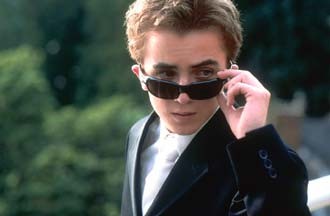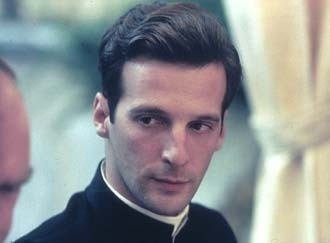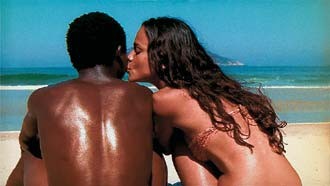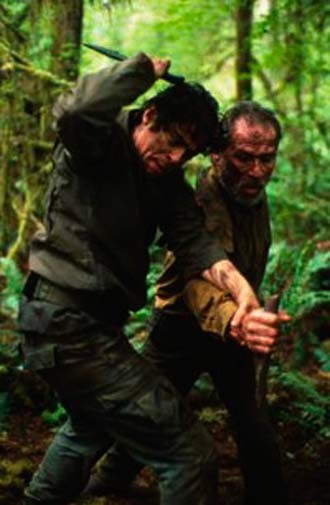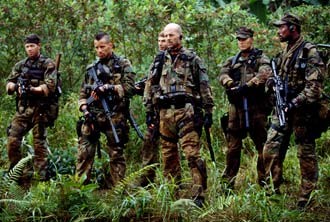Dir. Harold Zwart; writ. Ashley Edward Miller; feat. Frankie Muniz, Hilary Duff, Angie Harmon (PG)
The motif of the unflappable hero's alter-ego being a milquetoast is a timeless one for a reason: It makes us real-life milquetoasts feel as though we, too, could be heroes, albeit less attractive ones going about our business without a soundtrack.
Take teenaged CIA operative Cody Banks (Frankie Muniz), for example. He has trouble relating to the opposite sex (just like you!), especially when the opposite sex in question is foxy Hilary Duff (absolutely nothing like you!). This is a problem, since his mission is to become her boyfriend and learn more about her character's
| Frankie Muniz as Agent Cody Banks |
AMEN
Dir. Costa-Gavras; writ. Costa Gavras and Jean-Claude Grumberg, from a play by Rolf Hochhuth; feat. Ulrich Tukur, Mathieu Kassovitz, Ulrich Mühe, Michel Duchaussoy, Ion Caramitru (PG)
In 1963, Rolf Hochhuth, a German playwright who dared break a conspiracy of silence over the Holocaust, outraged audiences when the Deputy accused the Vatican of indifference and even complicity. Forty years later, after a small library - including James Carroll's recent anguished history of Catholic anti-Semitism, Constantine's Sword - has documented the indictment, Costa-Gavras's latest film arrives with the force of homily more than drama. Based loosely on the
| Mathieu Kassovitz as Riccardo Fontana in Amen |
BRINGING DOWN THE HOUSE
Dir. Adam Shankman; writ. Jason Filardi; feat. Steve Martin, Queen Latifah, Eugene Levy, Joan Plowright, Jean Smart (PG-13)
Years ago, after a stretch of unfunny comedies, Steve Martin took a long vacation to get his act together. He came back and made Bowfinger, a seriously hilarious film that also gave Eddie Murphy a chance to be funny again. But what convinced him to make the lunkheaded Bringing Down the House?
In this odd-couple setup - escaped con Queen Latifah imposes herself on tax lawyer Martin until he can clear her name - all the jokes hinge on the difference between what's acceptable in prim white culture and what passes for etiquette in Latifah's world. But the film has so little sense about the way real humans behave, both black and white, that it seems to have been made by neither - and not a Latino or Asian, either, but a computer program that learned about humanity from sitcoms and Chris Columbus movies. After the screenplay was printed and filmed, another computer program named after Lalo Schifrin was used to lacquer the image with saccharine clarinet melodies and prancing strings.
Amid the constructs that in a deeper movie would be called stereotypes - the gold digging sister-in-law, the golf-pro gigolo, the backstabbing junior exec - are a couple of minor bright spots. Eugene Levy, as a straight-laced accountant who falls in lust at first sight with Latifah, has the same lame dialogue as everybody else, but knows enough to deliver his faux-homeboy-ese in a pinched monotone; he reads lines like "I'm all twisted up in your game" as if he were talking about corporate profits, and steals most of the scenes he's in. But he's not onscreen enough to save the film.
In another cinematic life, Steve Martin may have been "born a poor black child"; but he's all grown up now, and ought to be able to spot a clunker like Bringing Down the House when he sees it. — JOHN DEFORE
CITY OF GOD
Dir. Fernando Meirelles; writ. Paulo Lins (novel), Bráulio Mantovani; feat. Alexandre Rodrigues, Firmino da Hora, Phelipe Haagensen, Johnathan Haagensen, Matheus Nachtergaele, Seu Jorge (R)
Quick glimpses of a knife being sharpened, slipped between shots of a bustling crowd, open Brazil's City of God; there's a chicken to slaughter, and when it flees, an army of children pursue it with handguns. The odds don't favor the fowl, nor are they
| Alexandre Rodrigues and Alice Braga smooch in the sun in City of God |
The youths have names like Li'l Dice, Shaggy, and Carrot, and we watch them as the decades shoot by; new actors come in to play them as adults while another brood of kids, more feral than the first, emerges to nip at their heels. Li'l Zé, the one truly bloodthirsty man in a world of casual thugs, rises to the top of a drug empire by killing off the competition. His ascent is documented in a quicksilver sequence called "The Story of the Apartment," which uses partial dissolves and voiceover to show in seconds the evolution of a woman's home into a drug hangout that changes hands with each shift in power.
The good-hearted witness to the City's story is Rocket. His brother was a hood, but he doesn't have the temperament for it - as we see in a funny interlude when he decides to take up theft, but sadly concludes that each stranger he picks to victimize is "too cool" to harm. Rocket wants to be a photographer, and eventually gets work at a city newspaper when reporters, who won't venture onto his turf themselves, ask him to document what's going on around him.
Director Fernando Meirelles balances his viewpoint between Rocket's cautious innocence and the vice around him. The story's early years are shot in sun-drenched yellow and gold, its minor-league villainy presented as playground antics. But when the '60s give way to the '70s, the sun's light gets more vicious, the shadows dirtier, and there's no mirth in power - Li'l Zé is king, but of what?
His right-hand man tries to keep his position while courting the affections of the "groovy people," kids like Rocket who hang out at the beach and smoke what the hoods are selling. He dyes his hair, updates his wardrobe, and guilelessly steals the girl Rocket wants for himself. To balance this shift, the slum's one straight arrow, a bus driver called Knockout Ned, joins Li'l Zé's rivals when Zé kills his brother. With a strong personality to lead the opposition, the city (and the film) turn into a cauldron of gunpowder, sweat, and testosterone.
Meirelles' themes and cinematic verve owe a lot to Martin Scorsese, and more than once this tale looks like Gangs of New York's younger, South American cousin. Its romance and revenge aren't grafted on, though; they're organic parts of this backalley epic. And while City has nothing like the violent spectacle Scorsese nails in Gangs, the absence of lavish sets and costumes doesn't make the conflict less shocking. City of God tears through the theater on its own steam, full of flash and dying to get this sordid story beyond the walls that contain it. — JOHN DEFORE
THE HUNTED
Dir. William Friedkin; writ. David & Peter Griffiths, Art Monterastelli; feat. Tommy Lee Jones, Benicio Del Toro, Connie Nielsen, Jenna Boyd, Leslie Stefanson (R)
Opening with the fire-and-brimstone voice of Johnny Cash and shots of a war-painted Benicio Del Toro that evoke Apocalypse Now, The Hunted lets you know immediately that what's ahead won't be child's play. It also, thank goodness, is nothing like
| Benicio Del Toro and Tommy Lee Jones in The Hunted |
In some ways it more resembles a Fugitive remake: Jones is the über manhunter, his prey escapes after the van ferrying him to his doom overturns in an accident, the chase takes a dramatic turn involving a surprise plunge into deep water. But those are superficial similarities. The taciturn man Jones plays here makes his Agent Gerard look like Chatty Kathy, this chase is more primal than The Fugitive's covert detective story, and few viewers will empathize with Del Toro, whose years as a black ops military man have made him a paranoid killer.
Friedkin strips the story to its bones, which works perfectly for this testosterone showcase. He stumbles briefly near the end, contriving a way to get both his protagonists lost in the wilderness without access to decent knives (they make their own, in an "A-Team"-ish sequence) - but more than compensates with two extraordinarily brutal scenes of hand-to-hand combat, maybe the best sequences of their kind ever shot. — JOHN DEFORE
TEARS OF THE SUN
Dir. Antoine Fuqua; writ. Patrick Cirillo, Robert Orr; feat. Bruce Willis, Monica Bellucci, Cole Hauser (R)
The depiction of a world in which good and evil are unequivocally demarcated will always fail as art, with any emotions invoked by scenes of the statically valiant thwarting husky-skinned caricatures of wickedness hollow sensations, indeed. Movie-goers would do well to always keep this in mind, lest their moral compasses be fogged
| Bruce Willis in Tears of the Sun |
Bruce Willis plays Lieutenant A.K Waters, a Navy S.E.A.L. so noble, so devoted to the cause, that you could see him risking his life to save one of his dead troops' dog-tags. Assigned to rescue an American doctor (Monica Bellucci), and only her, from encroaching rebels in Nigeria, Waters violates orders and decides to liberate her refugee patients as well. It's this impossible brand of macho, messianic selflessness that sets in motion two hours of the most blithely pro-American-intervention propagandizing this side of "Fox News."
Tears of the Sun's greatest tragedy is its wasted potential. What could have been a powerful glimpse into the plight of war-pocked Africa is denigrated by clunking Hollywood convention: Monica Belluci's Dr. Kendricks has a perfect, very un-doctorlike figure, long eyelashes, and full lips; every U.S. soldier is either angelic (in the violent, Old Testament sense) or on the way to it; and the bad guys, faceless cogs in a phalanx of subhuman monsters committing atrocities for atrocity's sake, are so bad that they have to suppress grins as they chop babies into pieces.
Tears is dizzying in its offensiveness and calculated simplicity, even more so when one realizes that calculated simplicity was the point all along. — JOE WEISS

